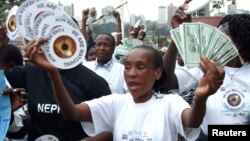Kenyans living with HIV or AIDS in Kibera, Nairobi's largest slum, are finding support groups essential to coping with the health, economic and social challenges they face.
Peter Oduor is a teacher at Kibera’s Tumaini primary school. Five years ago, he tested positive for HIV. He believes most of the slum's residents are susceptible to the virus because of poverty.
“In Kibera here, HIV is mostly spread because of poverty," he said. "You find that there are people who need to feed their families; for them to get money to feed their families, they engage in prostitution, they abuse drugs, most of them drink. And when someone is drunk, they can do anything to get money.”
Oduor said as a teacher he has a responsibility to be a role model for his students - in spite of the stigma attached to the virus. In addition, with HIV, he needs to eat well to keep his immune system strong and to spend eight hours a day on his feet instructing students.
Providing support
But healthy foods and medicines cost money. Oduor earns a modest salary of $45 per month, or about $1.50 per day. He can feed himself, but there's no way he can afford ARV [antiretroviral drugs] therapy, which costs about $45 a week.
That is where a number of HIV/AIDS support groups in Kibera come in -- offering both free medications and psychosocial counseling to those infected with HIV, as well as their partners, families and caregivers.
These groups work in partnership with government-run clinics in Kibera to distribute ARVs at no cost. But their work goes beyond free medicine, said Oduor.
“You can go to the hospital and find that medicines are not there and so you have to buy," he said. "So if you don’t have money, those support groups can help you to get the medication.”
There are more than 100 support groups in the slum that work closely with to reach as many HIV-infected people as possible.
Facing early death
Kibera is home to some one million people and the United Nations estimates that HIV prevalence rate here is at least 10 percent.
Many of those infected are facing an early death. The Kibera Law Center notes that life expectancy in Kibera is 30 years of age compared to 50 in the rest of the country.
Babra Ngedi, 28, discovered she was HIV-positive four years ago during a routine pre-natal clinic appointment. Her daughter is HIV-free, though, thanks to the help of the Kibera South Wanga Hospital, a government run clinic.
She said ARVs have helped reduce mother-to-child transmission of the virus, but more could be done.
“They are trying their best but if we could have more NGO’s, I think it will be helpful," said Ngedi. "Then they will support us more, especially for pregnant women and breastfeeding mothers.”
Peer counseling
Ruth Njagi, founder of ‘Second Chance Consults,’ which deals with reproductive related issues including HIV/AIDS, says normalizing HIV through peer support is almost as important as medication for those infected.
“Being HIV comes with the normal loss and grief stages, like shock, denial and sometimes people take so much time when they are denying," said Njagi. "They don’t seek help or anything because they are in denial. But when they are able to join a support group and listen to other people, they are able to come in terms with their status and acceptance is actually the key to living positively.”
And this is why Oduor looks forward to the weekly meetings of his support group.
“When you go to hospital, you meet people with the same status and from there you talk and exchange ideas," said Oduor. "And the closest friend that I have is the one who encourages me and tells me to do this and that and so I feel like am welcomed and am one of them.”
The United Nations estimates approximately 1.3 million Kenyans are living with HIV, including 156,000 children. Oduor said he considers himself as one of the lucky few who are getting free access to lifesaving medication and understanding.
Rael Ombuor in Nairobi contributed to this report.




